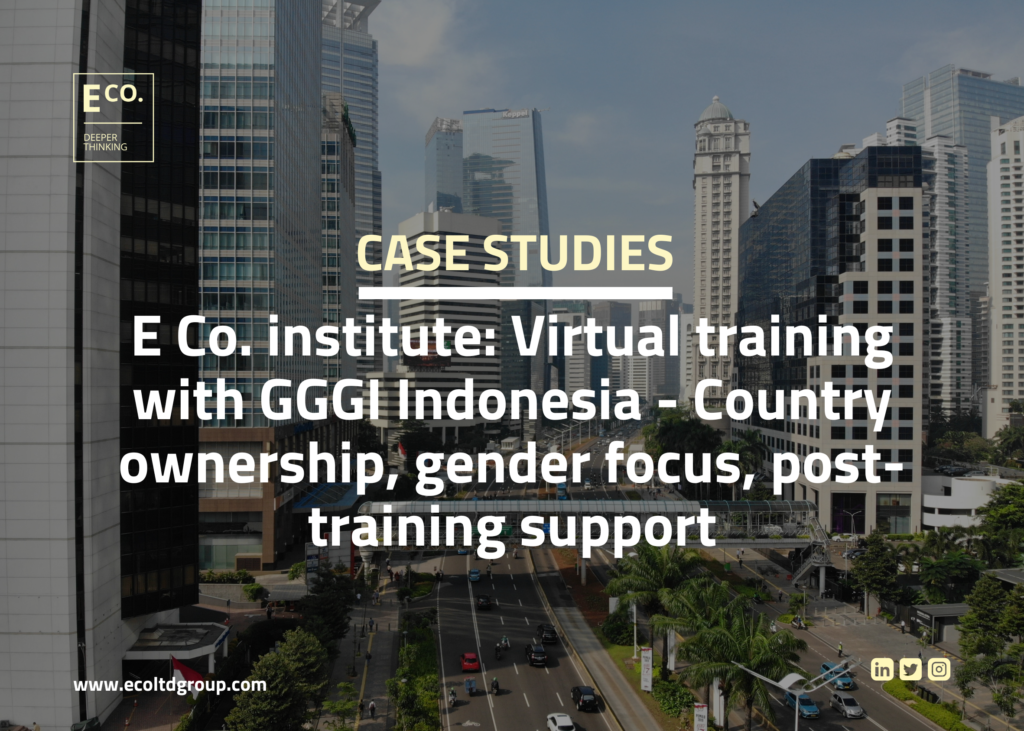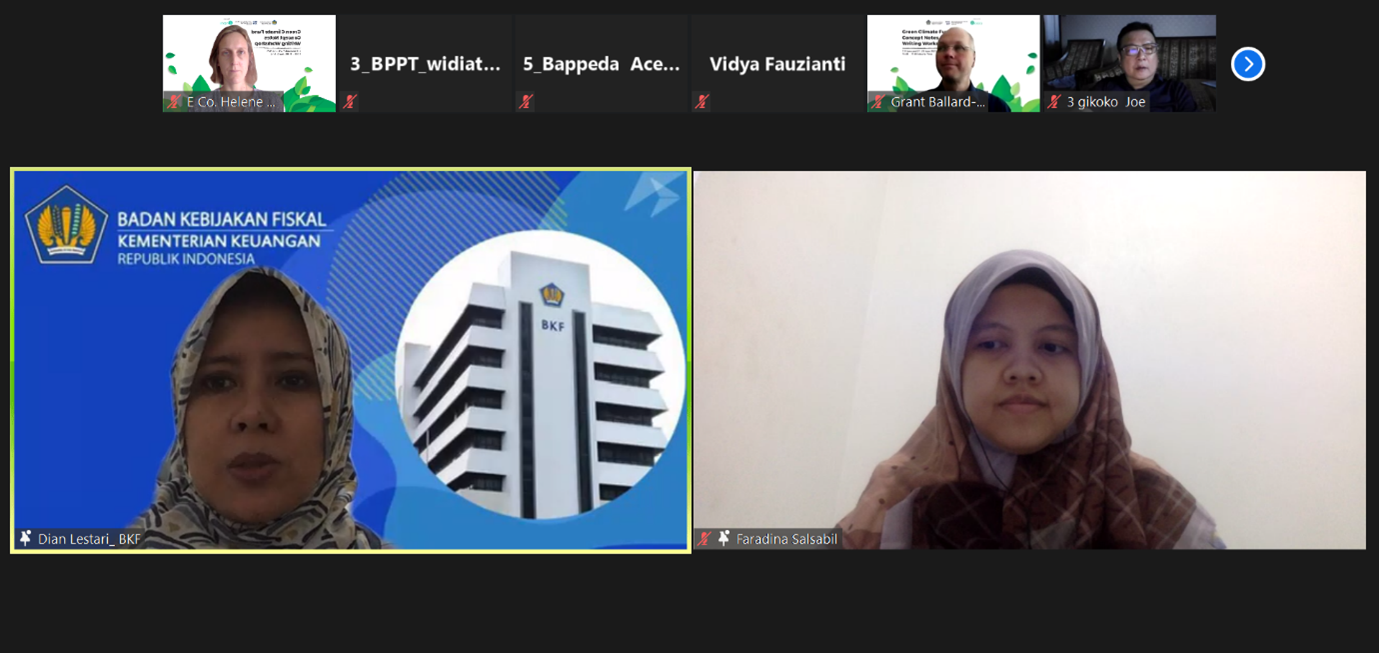E Co. institute: Virtual training with GGGI Indonesia – Country ownership, gender focus, post-training support

Explore this E Co. institute case study where we delivered post-training support on country ownership and gender with GGGI Indonesia.
Indonesia is a country made up of just under 18,000 islands and has an economy highly reliant on the agriculture sector, particularly orientated around the production of soybeans and rice.[1] Thus, Indonesia is not only vulnerable to climate change impacts, but also contributes significantly to global greenhouse gas emissions, stemming from deforestation and peatland megafires.[2] The GGGI and Indonesian Nationally Designated Authority (NDA) have collaborated to address barriers that organisations face when it comes to designing climate change projects. E Co. has been engaged to implement the technical capacity support.
A unique approach in promoting country ownership
To boost participation in developing projects for funding from the GCF, the Indonesian NDA, in partnership with GGGI, launched this call to submit project ideas aimed at mitigating or adapting to climate change. The best ideas qualified to participate in an intensive training and coaching programme to develop their project concepts into a full GCF concept note. This is an effective way to enhance country ownership – as projects are demand-based and from the field.
Building on our previous training sessions
E Co. was selected once more to implement this second round to help climate change project developers in Indonesia to refine their climate adaptation / mitigation and cross-cutting project ideas. The first round was delivered in 2019-2020.
You can read more about our previous experience here:
- Supporting local actors in Indonesia: GCF concept note writing workshop
- E Co. institute: Building capacity together with GGGI Indonesia – paradigm shift, climate rationale
- E Co. Lunch breaks: GGGI’s Call for Project Concept Notes – Unlocking Indonesia’s climate project potential
As in the previous assignment, this assignment is split into two phases. The first is comprised of 6 days of online group training, and the second round consists of online coaching support. For the second round, we will do webinars on different topics, provide one-on-one support to participants to refine their GCF concept notes, and review each concept note three times. The aim is to develop and strengthen 15 concept notes by the end of entire programme. As of July 2021, we have wrapped up the training and are preparing for the second phase – online coaching.
Making the most of virtual learning tools
For the second call, the training was different from usual due to COVID-19, as we went fully virtual. The online training took place in June 2021. The training consisted of 6 half days spread over two weeks, with a one week break in between. Now with extensive Zoom experience, we made use of different functions such as the simultaneous interpretation, break out groups and the Zoom polling function. To make our sessions interactive and keep participants engaged, we used Jamboard (an online whiteboard) for breakout activities, and Kahoot quizzes.
For translation from English to Indonesian and vice versa, we had two interpreters from Indonesia to interpret simultaneously. This proved to worked very well. We see this tool opening many doors to conducting trainings all over the world in different languages. This time around, we also worked with a local expert, Ari Rakatama, who added value to the training by drawing on local examples and context.
A focus on gender and post-training needs
Our approach to the training is to provide insight and tools to develop each section of the GCF concept note. Each session we took a deep dive into one of the more challenging topics, such as paradigm shift, theory of change, climate rationale, problem tree – the sticky topics that we see many of our clients struggle with when designing GCF projects.
One significant moment for the training team was when we received a request from the client to present on gender a lot sooner than planned (on day 3 instead of day 5). The purpose was to emphasise the importance of gender mainstreaming throughout the design process and to avoid the topic being an afterthought. This is indeed an issue we see in many climate change projects, thus from now on we will ensure that we present gender earlier on in the training and emphasise a holistic integration of gender throughout the project design. This was a good lesson learnt for us!
We wrapped up the training by taking some time to reflect on the training and key learnings, alongside what topics the participants would like to revisit. The most popular topic on demand was gender, which will be considered when designing the three webinars for the next phase: online coaching.
Overcoming challenges in online training
Some participants made comments that face-to-face trainings were a lot preferable – one mentioning that it was hard to concentrate longer during online training.
The benefits of online training are the online translation, training is accessible to everyone (on the assumption that everyone has access to a good internet connection), and the reduction of travel time to attend the training. As mentioned above, we have included several different tools to make the sessions more interactive and we do deep dives into topics, usually one per session, to avoid overwhelming the participants with too much information.
Our working relationship with GGGI started in 2019. We were engaged to provide support to develop concept notes through a double-pronged process: a workshop followed by online coaching. Learn more about that here [link].
Next steps
Participants now have time to revise and further develop their project concepts, drawing on the learnings from the training. This will be followed by a match-making session organised by the NDA and GGGI with accredited entities (AEs) – another example of an exemplary way to move projects forward and prepare them for submission with the GCF (as GCF funds need to be channelled through an AE). After the match making session, we will dive into the online coaching phase!
We hope with the first phase of the training complete, that participants can sink their teeth into their concepts and improve their project using the tools we worked on during the training – for example, strengthening their climate rationale that clearly demonstrates how the project addresses climate change issues, and not development-related issues. This is a common issue, and we observe that the GCF has made comments about this in the past. We look forward to continuing our support to improve the participant’s ability to design concept notes for the GCF – with the next step – online coaching.
[1] https://www.ifpri.org/publication/impact-global-climate-change-indonesian-economy#:~:text=Under%20climate%20change%2C%20Indonesia%20is,the%20rainy%20season%20becoming%20shorter.
[2] https://www.carbonbrief.org/the-carbon-brief-profile-indonesia
Need climate finance training for you or your team? Learn more about our E Co. institute offerings here.
Looking for insight into climate finance? Look no further
Let’s accelerate progress together: Get in touch with our climate finance consultants to discuss a project you’re working on. Email us at: amy@ecoltdgroup.com or find us at the following:
Twitter: @ecoltdnews
LinkedIn: E Co.
Instagram: @ecoltdnews
